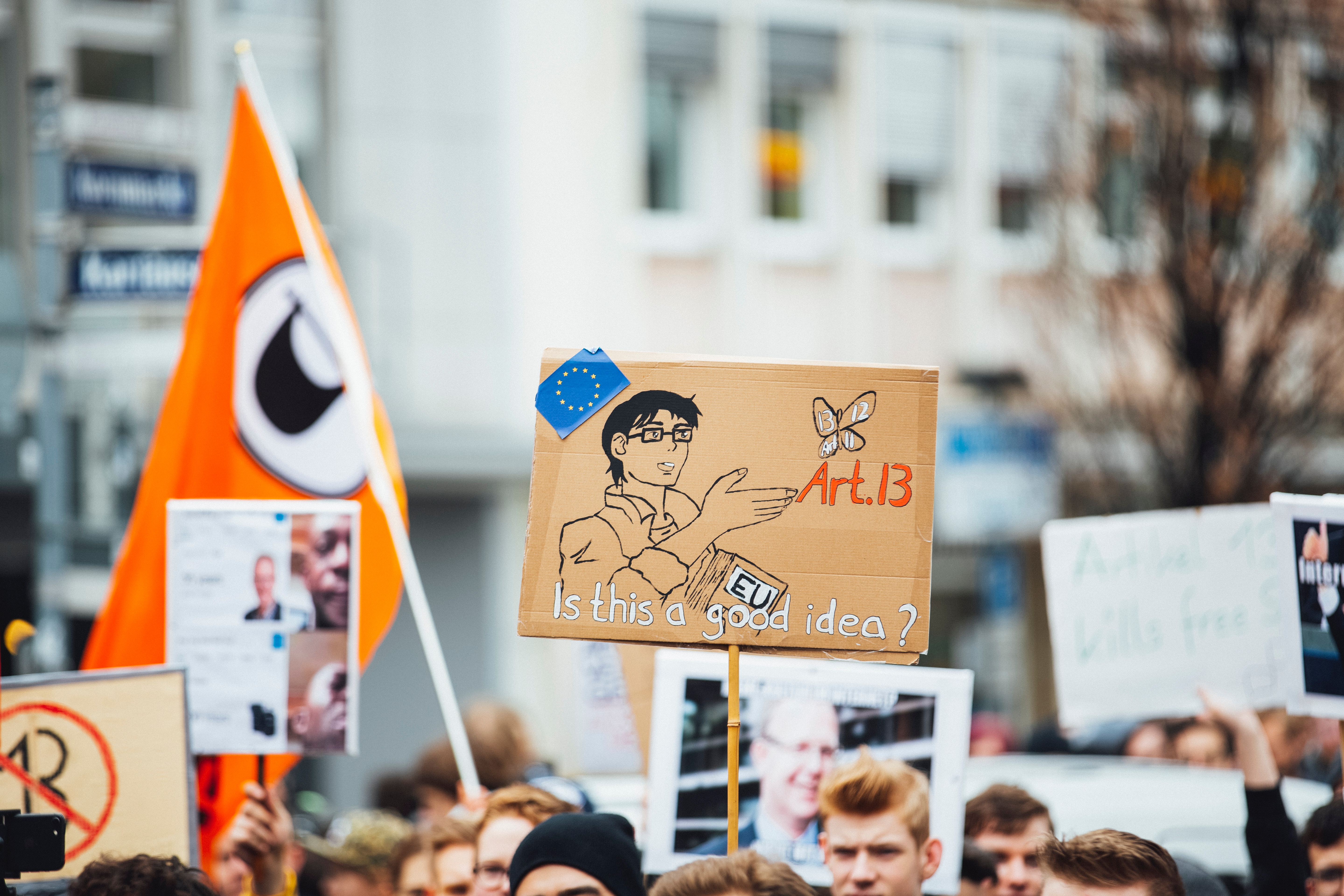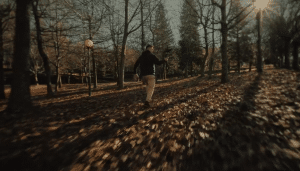
What is the new EU Copyright Directive?
If you’re a Content Creator, YouTube User, or Meme Enthusiast, you’ve probably heard whispers (and shouts) about Article 13 and Article 11, two sections of the EU Directive on Copyright in the Digital Single Market.
On the 26 May 2019, members of the European Parliament voted to adopt the new directive, including the two controversial articles. There were 348 votes in
The directive as a whole aims to reduce the ‘value gap’ between profits made by online hosting platforms (Such as YouTube and Facebook) and the copyright-holders (such as photographers, videographers, writers and artists) who own the creative rights to that content. So far, so good. However, Articles 15 (previously article 11) and 17 (previously article 13) – known informally as the Link Tax and the Meme Ban respectively – have triggered debates over their efficacy.

‘The Link Tax’ is in fact a misnomer. The nickname refers to a section of the legislation that concerned with news aggregator sites and similar platforms. It requires that they pay copyright fees for the content they display, when they feature headlines, teaser text, images or videos belonging to writers and their original publishing platforms. Publishers and individuals alike will not be penalised for sharing hyperlinks, words, or very short extracts of written news materials.
‘The Meme Ban’ puts the onus on hosting sites, previously exempt from copyright liabilities under their role as a ‘mere conduit’, to ensure that copyrighted materials, such as videos, are hosted only by the their respective copyright owners, from the moment of upload. It’s known as the meme ban, because it’s unclear to what extent this legislation will affect online phenomena such as memes, parody videos and gaming streams, which operate in the copyright grey-area of free use. (Read more about what “free use” and other copyright-related terms mean in our glossary).

What’s the issue?
The legislation has been praised by many as a legal change that will, if approved, lead to a fairer partnership between creatives and their distribution platforms, allowing them greater leverage in licensing partnerships and contracts, greater control over the dissemination of their creative works, and most of all, close the gap between the profit made by the artists, and the profit made by the platforms who host their work.
However, those who object to the changes brought about by these two articles in particular fear that the stricter laws will have outcomes that harm, rather than help, the independent and small-scale copyright-owners they aim to protect; spearheading the #saveyourinternet campaign, YouTube claim that the new legislation will be bad for users, because they will have access to less content, and be limited in how they can share their own and others’ content.
Furthermore, they predict that it will negatively affect creators, limiting the number of sharing platforms available to them, alongside the increased risk of arbitrary removal of their content and, finally, that it will only be the large companies who can afford to make the necessary changes to comply. Opponents also argue that the filtration algorithms would need to be so exhaustive, that they would amount to censorship, severely limiting online freedom of expression, commentary, and satire alongside genuine copyright breaches.

The legislation does, however, make exceptions for start-ups and small businesses, stating that they will be subject to a much more lax enforcement of the proposed changes. But in cases of rapid growth, once small-scale businesses and recently-established companies surpass 5m monthly users, achieve more than €10m annual revenue, or have been part of the EU market for more than 3 years, there is concern that they will find themselves unable to make the changes required to compete with long-established industry giants such as Google News, Reddit, or Snapchat.
Will I Still be Able To Use Stock Footage from Videvo?
Since we, at Videvo, create, commission or acquire distribution rights for all our content, whether audio or video, free or premium, you won’t see a change to the quality of quantity of stock media we host, or the frequency with which we release new content. However, if opponents to Article 15 (prev. Article 13) are correct in their predictions you may well encounter changes to the platforms where you publish and share the projects made using our stock library.

For users in EU member states, there may be an increase in the number of copyright notices your projects receive, whether newly uploaded, or long-standing components of your YouTube Channel, Facebook page or Instagram account. (We’ve covered the reasons why you may currently encounter a YouTube copyright claim here.)
You may be prevented from uploading new projects or that old projects are removed, if they contain videos which have been previously monetised or are part of a wider project claimed under copyright. This is not because you don’t have the right to use our content under the terms stipulated in our licensing conditions, but because this reforms may see hosting websites erring on the side of caution, to avoid risking legitimate copyright claims.
For users outside the EU, you may find that viewers and consumers within the European Union are no longer able to view your videos, or listen to podcasts which use our sound effects, for example, limiting your audience and reach.

If this happens, it will be because content-trawling algorithms as they are, and are likely to be in the near future, cannot distinguish between fair-use and copyright infringement in and of themselves. Previously, this has not been an issue on platforms, because the algorithms are applied after the content has been uploaded, and are able to be contested. However, with platforms liable for all the copyrights they host, algorithms will need to be put in place before content is published; namely in the period between uploading and publishing your content.
Should I Be Worried?

It’s worth stressing that many of the concerns regarding Articles 15 and 17 are due to what has not been covered or clarified in the existing proposals – such as fair use of paintings and photographs, etc. – uncertainty over the ways in which the new laws will be carried out, and the severity of penalisation if breached or neglected.
Since they have been passed with the aim of helping creatives and creators reap the benefits and profits due to them, the new legislation may well bring about positive changes. What we can expect is a redistribution of the power creators and distributors hold over creative works, their consumption, and their re-purposing. Since stock media is created, distributed, used and consumed with these purposes in mind, and is designed precisely as a way of avoiding the same copyright breaches these laws aim to prevent, rest assured, we’ll be here to cover all your video needs!




